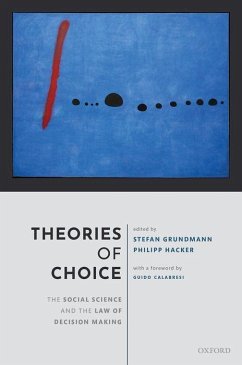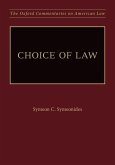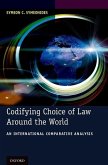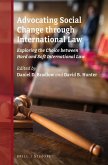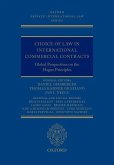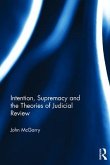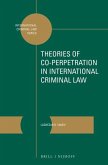Theories of Choice
The Social Science and the Law of Decision Making
Herausgeber: Grundmann, Stefan; Hacker, Philipp
Theories of Choice
The Social Science and the Law of Decision Making
Herausgeber: Grundmann, Stefan; Hacker, Philipp
- Gebundenes Buch
- Merkliste
- Auf die Merkliste
- Bewerten Bewerten
- Teilen
- Produkt teilen
- Produkterinnerung
- Produkterinnerung
This book provides an in-depth discussion of the promises and perils of specific types of theories of choice. It shows how the selection of a specific theory of choice can make a difference for concrete legal questions, in particular in the regulation of the digital economy or in choosing between market, firm, or network.
Andere Kunden interessierten sich auch für
![Choice of Law Choice of Law]() Symeon C SymeonidesChoice of Law277,99 €
Symeon C SymeonidesChoice of Law277,99 €![Codifying Choice of Law Around the World Codifying Choice of Law Around the World]() Symeon C SymeonidesCodifying Choice of Law Around the World166,99 €
Symeon C SymeonidesCodifying Choice of Law Around the World166,99 €![Advocating Social Change Through International Law: Exploring the Choice Between Hard and Soft International Law Advocating Social Change Through International Law: Exploring the Choice Between Hard and Soft International Law]() Advocating Social Change Through International Law: Exploring the Choice Between Hard and Soft International Law214,99 €
Advocating Social Change Through International Law: Exploring the Choice Between Hard and Soft International Law214,99 €![Choice of Law in International Commercial Contracts Choice of Law in International Commercial Contracts]() Choice of Law in International Commercial Contracts355,99 €
Choice of Law in International Commercial Contracts355,99 €![Intention, Supremacy and the Theories of Judicial Review Intention, Supremacy and the Theories of Judicial Review]() John McgarryIntention, Supremacy and the Theories of Judicial Review180,99 €
John McgarryIntention, Supremacy and the Theories of Judicial Review180,99 €![Choice of Law and Recognition in Asian Family Law Choice of Law and Recognition in Asian Family Law]() Choice of Law and Recognition in Asian Family Law195,99 €
Choice of Law and Recognition in Asian Family Law195,99 €![Theories of Co-Perpetration in International Criminal Law Theories of Co-Perpetration in International Criminal Law]() Lachezar D. YanevTheories of Co-Perpetration in International Criminal Law354,99 €
Lachezar D. YanevTheories of Co-Perpetration in International Criminal Law354,99 €-
-
-
This book provides an in-depth discussion of the promises and perils of specific types of theories of choice. It shows how the selection of a specific theory of choice can make a difference for concrete legal questions, in particular in the regulation of the digital economy or in choosing between market, firm, or network.
Produktdetails
- Produktdetails
- Verlag: Oxford University Press, USA
- Seitenzahl: 352
- Erscheinungstermin: 14. März 2021
- Englisch
- Abmessung: 236mm x 155mm x 30mm
- Gewicht: 953g
- ISBN-13: 9780198863175
- ISBN-10: 0198863179
- Artikelnr.: 60140366
- Verlag: Oxford University Press, USA
- Seitenzahl: 352
- Erscheinungstermin: 14. März 2021
- Englisch
- Abmessung: 236mm x 155mm x 30mm
- Gewicht: 953g
- ISBN-13: 9780198863175
- ISBN-10: 0198863179
- Artikelnr.: 60140366
Dr. Stefan Grundmann, LL.M. (Berkeley), is a Professor of Transnational Law and Theory at the European University Institute (Florence) and Professor of Private and Business Law at Humboldt University Berlin. His major publications in several languages include overall treatises on European Company Law, European Contract Law, Banking and Capital Market Law, New Private Law Theory, and a host of articles in these areas, including transnational and interdisciplinary governance issues. He is editor-in-chief of the European Review of Contract Law, the Ius Communitatis series of textbooks, and president of the Society of European Contract Law (SECOLA), of the European Law School (Berlin/London/Paris/Rome/Amsterdam), and of the Theory section of the German Association of Comparative Law. Dr. Philipp Hacker, LL.M. (Yale) is a Professor of Law and Ethics of the Digital Society at the European New School of Digital Studies, located at European University Viadrina, and a Research Fellow at the Centre for Law, Economics and Society and at the Centre for Blockchain Technologies, both at University College London. Previous positions included an AXA Postdoctoral Fellowship at Humboldt University Berlin, a Max Weber Fellowship at the European University Institute and an A.SK Fellowship at the WZB Berlin Social Science Center. His research focuses on behavioral law and economics as well as the interplay between emerging technologies and the law.
* Theories of Choice and the Law - An Introduction
* Part I: Foundations
* 1: Christoph Engel: The Proper Scope of Behavioural Law and Economics
* 2: Simon Deakin: Rational Choice and its Limits for the Solution and
Legal Problems: Three Observations on Behavioural Law and Economics
* 3: Marlies Ahlert: Game Theory and the Law: Incomplete Knowledge
About the Knowledge of Other Players
* Part II: Individual Choice and the Law
* 4: Lucia A. Reisch, Cass R. Substein and Micha Keiser: Most People
Like Nudges - And Why That Matters
* 5: Philipp Hacker: Regulating Under Uncertainty About
Rationality: From Decision Theory to Machine Learning and Complexity
Theory
* 6: Anne-Lise Sibony: Did You Say 'Theories of Choice'?: On the
Limited and Variable Appetite for Theories in Consumer Law
* Part III: Collective Choice and the Law
* 7: Adrienne Heritier: Itinera Europea: Four Scenarios and their
Plausibility
* 8: Matthew D. Adler: The Social Welfare Function: A New Tool for
Regulatory Policy Analysis
* 9: Andreas Engert: Collective Intelligence: Crowd Wisdom Versus
Herding
* Part IV: Organizational Choice and the Law
* A. Firms
* 10: Julian Velasco: Decision Theory and Allocation Decision Making in
the Firm
* 11: Luca Enriques and Alessandro Romano: Institutional Investor
Voting Behaviour: A Network Theory Perspective
* B. Institutions, Networks, and Courts
* 12: Genevieve Helleringer: Conflict of Interest and Decision-Making
* 13: Stefan Grundmann: Decision Making in Chains and Networks of
Contracts
* 14: Christopher Brett Jaeger and Jennifer S. Trueblood: The Power of
Sequence: A Quantum Perspective on Legal Decision Making
* Part I: Foundations
* 1: Christoph Engel: The Proper Scope of Behavioural Law and Economics
* 2: Simon Deakin: Rational Choice and its Limits for the Solution and
Legal Problems: Three Observations on Behavioural Law and Economics
* 3: Marlies Ahlert: Game Theory and the Law: Incomplete Knowledge
About the Knowledge of Other Players
* Part II: Individual Choice and the Law
* 4: Lucia A. Reisch, Cass R. Substein and Micha Keiser: Most People
Like Nudges - And Why That Matters
* 5: Philipp Hacker: Regulating Under Uncertainty About
Rationality: From Decision Theory to Machine Learning and Complexity
Theory
* 6: Anne-Lise Sibony: Did You Say 'Theories of Choice'?: On the
Limited and Variable Appetite for Theories in Consumer Law
* Part III: Collective Choice and the Law
* 7: Adrienne Heritier: Itinera Europea: Four Scenarios and their
Plausibility
* 8: Matthew D. Adler: The Social Welfare Function: A New Tool for
Regulatory Policy Analysis
* 9: Andreas Engert: Collective Intelligence: Crowd Wisdom Versus
Herding
* Part IV: Organizational Choice and the Law
* A. Firms
* 10: Julian Velasco: Decision Theory and Allocation Decision Making in
the Firm
* 11: Luca Enriques and Alessandro Romano: Institutional Investor
Voting Behaviour: A Network Theory Perspective
* B. Institutions, Networks, and Courts
* 12: Genevieve Helleringer: Conflict of Interest and Decision-Making
* 13: Stefan Grundmann: Decision Making in Chains and Networks of
Contracts
* 14: Christopher Brett Jaeger and Jennifer S. Trueblood: The Power of
Sequence: A Quantum Perspective on Legal Decision Making
* Theories of Choice and the Law - An Introduction
* Part I: Foundations
* 1: Christoph Engel: The Proper Scope of Behavioural Law and Economics
* 2: Simon Deakin: Rational Choice and its Limits for the Solution and
Legal Problems: Three Observations on Behavioural Law and Economics
* 3: Marlies Ahlert: Game Theory and the Law: Incomplete Knowledge
About the Knowledge of Other Players
* Part II: Individual Choice and the Law
* 4: Lucia A. Reisch, Cass R. Substein and Micha Keiser: Most People
Like Nudges - And Why That Matters
* 5: Philipp Hacker: Regulating Under Uncertainty About
Rationality: From Decision Theory to Machine Learning and Complexity
Theory
* 6: Anne-Lise Sibony: Did You Say 'Theories of Choice'?: On the
Limited and Variable Appetite for Theories in Consumer Law
* Part III: Collective Choice and the Law
* 7: Adrienne Heritier: Itinera Europea: Four Scenarios and their
Plausibility
* 8: Matthew D. Adler: The Social Welfare Function: A New Tool for
Regulatory Policy Analysis
* 9: Andreas Engert: Collective Intelligence: Crowd Wisdom Versus
Herding
* Part IV: Organizational Choice and the Law
* A. Firms
* 10: Julian Velasco: Decision Theory and Allocation Decision Making in
the Firm
* 11: Luca Enriques and Alessandro Romano: Institutional Investor
Voting Behaviour: A Network Theory Perspective
* B. Institutions, Networks, and Courts
* 12: Genevieve Helleringer: Conflict of Interest and Decision-Making
* 13: Stefan Grundmann: Decision Making in Chains and Networks of
Contracts
* 14: Christopher Brett Jaeger and Jennifer S. Trueblood: The Power of
Sequence: A Quantum Perspective on Legal Decision Making
* Part I: Foundations
* 1: Christoph Engel: The Proper Scope of Behavioural Law and Economics
* 2: Simon Deakin: Rational Choice and its Limits for the Solution and
Legal Problems: Three Observations on Behavioural Law and Economics
* 3: Marlies Ahlert: Game Theory and the Law: Incomplete Knowledge
About the Knowledge of Other Players
* Part II: Individual Choice and the Law
* 4: Lucia A. Reisch, Cass R. Substein and Micha Keiser: Most People
Like Nudges - And Why That Matters
* 5: Philipp Hacker: Regulating Under Uncertainty About
Rationality: From Decision Theory to Machine Learning and Complexity
Theory
* 6: Anne-Lise Sibony: Did You Say 'Theories of Choice'?: On the
Limited and Variable Appetite for Theories in Consumer Law
* Part III: Collective Choice and the Law
* 7: Adrienne Heritier: Itinera Europea: Four Scenarios and their
Plausibility
* 8: Matthew D. Adler: The Social Welfare Function: A New Tool for
Regulatory Policy Analysis
* 9: Andreas Engert: Collective Intelligence: Crowd Wisdom Versus
Herding
* Part IV: Organizational Choice and the Law
* A. Firms
* 10: Julian Velasco: Decision Theory and Allocation Decision Making in
the Firm
* 11: Luca Enriques and Alessandro Romano: Institutional Investor
Voting Behaviour: A Network Theory Perspective
* B. Institutions, Networks, and Courts
* 12: Genevieve Helleringer: Conflict of Interest and Decision-Making
* 13: Stefan Grundmann: Decision Making in Chains and Networks of
Contracts
* 14: Christopher Brett Jaeger and Jennifer S. Trueblood: The Power of
Sequence: A Quantum Perspective on Legal Decision Making

